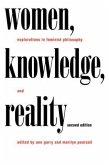Knowledge, Belief, and Strategic Interaction
Herausgeber: Bicchieri, Cristina; Cristina, Bicchieri; Dalla Chiara, Maria Luisa
Knowledge, Belief, and Strategic Interaction
Herausgeber: Bicchieri, Cristina; Cristina, Bicchieri; Dalla Chiara, Maria Luisa
- Broschiertes Buch
- Merkliste
- Auf die Merkliste
- Bewerten Bewerten
- Teilen
- Produkt teilen
- Produkterinnerung
- Produkterinnerung
This volume offers a conspectus of the interaction of game theory, logic, and epistemology in the formal models of knowledge, belief, deliberation and learning.
Andere Kunden interessierten sich auch für
![Belief, Truth and Knowledge Belief, Truth and Knowledge]() D. M. ArmstrongBelief, Truth and Knowledge33,99 €
D. M. ArmstrongBelief, Truth and Knowledge33,99 €![Knowledge, Value, Evolution Knowledge, Value, Evolution]() Knowledge, Value, Evolution24,99 €
Knowledge, Value, Evolution24,99 €![Questioning Nineteenth-Century Assumptions about Knowledge, Volume 1 Questioning Nineteenth-Century Assumptions about Knowledge, Volume 1]() Questioning Nineteenth-Century Assumptions about Knowledge, Volume 133,99 €
Questioning Nineteenth-Century Assumptions about Knowledge, Volume 133,99 €![The Doctrine Of Degrees In Knowledge, Truth And Reality The Doctrine Of Degrees In Knowledge, Truth And Reality]() Viscount HaldaneThe Doctrine Of Degrees In Knowledge, Truth And Reality12,99 €
Viscount HaldaneThe Doctrine Of Degrees In Knowledge, Truth And Reality12,99 €![Women, Knowledge, and Reality Women, Knowledge, and Reality]() Marilyn Pearsall (ed.)Women, Knowledge, and Reality61,99 €
Marilyn Pearsall (ed.)Women, Knowledge, and Reality61,99 €![Essays on the Pursuit of Truth: on the Progress of Knowledge, and on the Fundamental Principle of All Evidence and Expectation Essays on the Pursuit of Truth: on the Progress of Knowledge, and on the Fundamental Principle of All Evidence and Expectation]() Samuel BaileyEssays on the Pursuit of Truth: on the Progress of Knowledge, and on the Fundamental Principle of All Evidence and Expectation20,99 €
Samuel BaileyEssays on the Pursuit of Truth: on the Progress of Knowledge, and on the Fundamental Principle of All Evidence and Expectation20,99 €![Knowledge, Belief and Certitude [microform]: an Inquiry With Conclusions Knowledge, Belief and Certitude [microform]: an Inquiry With Conclusions]() Frederick Storrs TurnerKnowledge, Belief and Certitude [microform]: an Inquiry With Conclusions21,99 €
Frederick Storrs TurnerKnowledge, Belief and Certitude [microform]: an Inquiry With Conclusions21,99 €-
-
-
This volume offers a conspectus of the interaction of game theory, logic, and epistemology in the formal models of knowledge, belief, deliberation and learning.
Produktdetails
- Produktdetails
- Verlag: Cambridge University Press
- Seitenzahl: 432
- Erscheinungstermin: 29. Januar 2008
- Englisch
- Abmessung: 229mm x 152mm x 25mm
- Gewicht: 697g
- ISBN-13: 9780521061261
- ISBN-10: 0521061261
- Artikelnr.: 23527324
- Herstellerkennzeichnung
- Libri GmbH
- Europaallee 1
- 36244 Bad Hersfeld
- gpsr@libri.de
- Verlag: Cambridge University Press
- Seitenzahl: 432
- Erscheinungstermin: 29. Januar 2008
- Englisch
- Abmessung: 229mm x 152mm x 25mm
- Gewicht: 697g
- ISBN-13: 9780521061261
- ISBN-10: 0521061261
- Artikelnr.: 23527324
- Herstellerkennzeichnung
- Libri GmbH
- Europaallee 1
- 36244 Bad Hersfeld
- gpsr@libri.de
Preface
1. Feasibility Isaac Levi
2. Elicitation for games Joseph B. Kadane, Isaac Levi and Teddy Seidenfeld
3. Equilibrium, common knowledge, and optimal sequential decisions Joseph B. Kadane and Teddy Seidenfeld
4. Rational choice in the context of ideal games Edward F. McClennen
5. Hyperrational games: concept and resolutions Jordan Howard Sobel
6. Equilibria and the dynamics of rational deliberation Brian Skyrms
7. Tortuous labyrinth: noncooperative normal-form games between hyperrational players Wlodzimierz Rabinowicz
8. On consistency properties of some strongly implementable social choice rules with endogenous agenda formation Stefano Vannucci
9. Algorithmic knowledge and game theory Ken Binmore and Hyun Song Shin
10. Possible worlds, counterfactuals, and epistemic operators Maria Luisa Dalla Chiara
11. Semantical aspects of quantified modal logic Giovanna Corsi and Silvio Ghilardi
12. Epistemic logic and game theory Bernard Walliser
13. Abstract notions of simultaneous equilibrium and their uses Vittorioemanuele Ferrante
14. Representing facts Krister Segerberg
15. Introduction to metamoral Roberto Magari
16. The logic of Ulam's games with lies Daniele Mundici
17. The acquisition of common knowledge Michael Bacharach
18. The electronic mail game: strategic behavior under 'almost common knowledge' Ariel Rubinstein
19. Knowledge-depentent games: backward induction Cristina Bicchieri
20. Common knowledge and games with perfect information Philip J. Reny
21. Game solutions and the normal form John C. Harsanyi
22. The dynamics of belief systems: foundations versus coherence theories Peter Gärdenfors
23. Counterfactuals and a theory of equilibrium in games Hyun Song Shin.
1. Feasibility Isaac Levi
2. Elicitation for games Joseph B. Kadane, Isaac Levi and Teddy Seidenfeld
3. Equilibrium, common knowledge, and optimal sequential decisions Joseph B. Kadane and Teddy Seidenfeld
4. Rational choice in the context of ideal games Edward F. McClennen
5. Hyperrational games: concept and resolutions Jordan Howard Sobel
6. Equilibria and the dynamics of rational deliberation Brian Skyrms
7. Tortuous labyrinth: noncooperative normal-form games between hyperrational players Wlodzimierz Rabinowicz
8. On consistency properties of some strongly implementable social choice rules with endogenous agenda formation Stefano Vannucci
9. Algorithmic knowledge and game theory Ken Binmore and Hyun Song Shin
10. Possible worlds, counterfactuals, and epistemic operators Maria Luisa Dalla Chiara
11. Semantical aspects of quantified modal logic Giovanna Corsi and Silvio Ghilardi
12. Epistemic logic and game theory Bernard Walliser
13. Abstract notions of simultaneous equilibrium and their uses Vittorioemanuele Ferrante
14. Representing facts Krister Segerberg
15. Introduction to metamoral Roberto Magari
16. The logic of Ulam's games with lies Daniele Mundici
17. The acquisition of common knowledge Michael Bacharach
18. The electronic mail game: strategic behavior under 'almost common knowledge' Ariel Rubinstein
19. Knowledge-depentent games: backward induction Cristina Bicchieri
20. Common knowledge and games with perfect information Philip J. Reny
21. Game solutions and the normal form John C. Harsanyi
22. The dynamics of belief systems: foundations versus coherence theories Peter Gärdenfors
23. Counterfactuals and a theory of equilibrium in games Hyun Song Shin.
Preface
1. Feasibility Isaac Levi
2. Elicitation for games Joseph B. Kadane, Isaac Levi and Teddy Seidenfeld
3. Equilibrium, common knowledge, and optimal sequential decisions Joseph B. Kadane and Teddy Seidenfeld
4. Rational choice in the context of ideal games Edward F. McClennen
5. Hyperrational games: concept and resolutions Jordan Howard Sobel
6. Equilibria and the dynamics of rational deliberation Brian Skyrms
7. Tortuous labyrinth: noncooperative normal-form games between hyperrational players Wlodzimierz Rabinowicz
8. On consistency properties of some strongly implementable social choice rules with endogenous agenda formation Stefano Vannucci
9. Algorithmic knowledge and game theory Ken Binmore and Hyun Song Shin
10. Possible worlds, counterfactuals, and epistemic operators Maria Luisa Dalla Chiara
11. Semantical aspects of quantified modal logic Giovanna Corsi and Silvio Ghilardi
12. Epistemic logic and game theory Bernard Walliser
13. Abstract notions of simultaneous equilibrium and their uses Vittorioemanuele Ferrante
14. Representing facts Krister Segerberg
15. Introduction to metamoral Roberto Magari
16. The logic of Ulam's games with lies Daniele Mundici
17. The acquisition of common knowledge Michael Bacharach
18. The electronic mail game: strategic behavior under 'almost common knowledge' Ariel Rubinstein
19. Knowledge-depentent games: backward induction Cristina Bicchieri
20. Common knowledge and games with perfect information Philip J. Reny
21. Game solutions and the normal form John C. Harsanyi
22. The dynamics of belief systems: foundations versus coherence theories Peter Gärdenfors
23. Counterfactuals and a theory of equilibrium in games Hyun Song Shin.
1. Feasibility Isaac Levi
2. Elicitation for games Joseph B. Kadane, Isaac Levi and Teddy Seidenfeld
3. Equilibrium, common knowledge, and optimal sequential decisions Joseph B. Kadane and Teddy Seidenfeld
4. Rational choice in the context of ideal games Edward F. McClennen
5. Hyperrational games: concept and resolutions Jordan Howard Sobel
6. Equilibria and the dynamics of rational deliberation Brian Skyrms
7. Tortuous labyrinth: noncooperative normal-form games between hyperrational players Wlodzimierz Rabinowicz
8. On consistency properties of some strongly implementable social choice rules with endogenous agenda formation Stefano Vannucci
9. Algorithmic knowledge and game theory Ken Binmore and Hyun Song Shin
10. Possible worlds, counterfactuals, and epistemic operators Maria Luisa Dalla Chiara
11. Semantical aspects of quantified modal logic Giovanna Corsi and Silvio Ghilardi
12. Epistemic logic and game theory Bernard Walliser
13. Abstract notions of simultaneous equilibrium and their uses Vittorioemanuele Ferrante
14. Representing facts Krister Segerberg
15. Introduction to metamoral Roberto Magari
16. The logic of Ulam's games with lies Daniele Mundici
17. The acquisition of common knowledge Michael Bacharach
18. The electronic mail game: strategic behavior under 'almost common knowledge' Ariel Rubinstein
19. Knowledge-depentent games: backward induction Cristina Bicchieri
20. Common knowledge and games with perfect information Philip J. Reny
21. Game solutions and the normal form John C. Harsanyi
22. The dynamics of belief systems: foundations versus coherence theories Peter Gärdenfors
23. Counterfactuals and a theory of equilibrium in games Hyun Song Shin.









![Knowledge, Belief and Certitude [microform]: an Inquiry With Conclusions Knowledge, Belief and Certitude [microform]: an Inquiry With Conclusions](https://bilder.buecher.de/produkte/66/66158/66158771m.jpg)